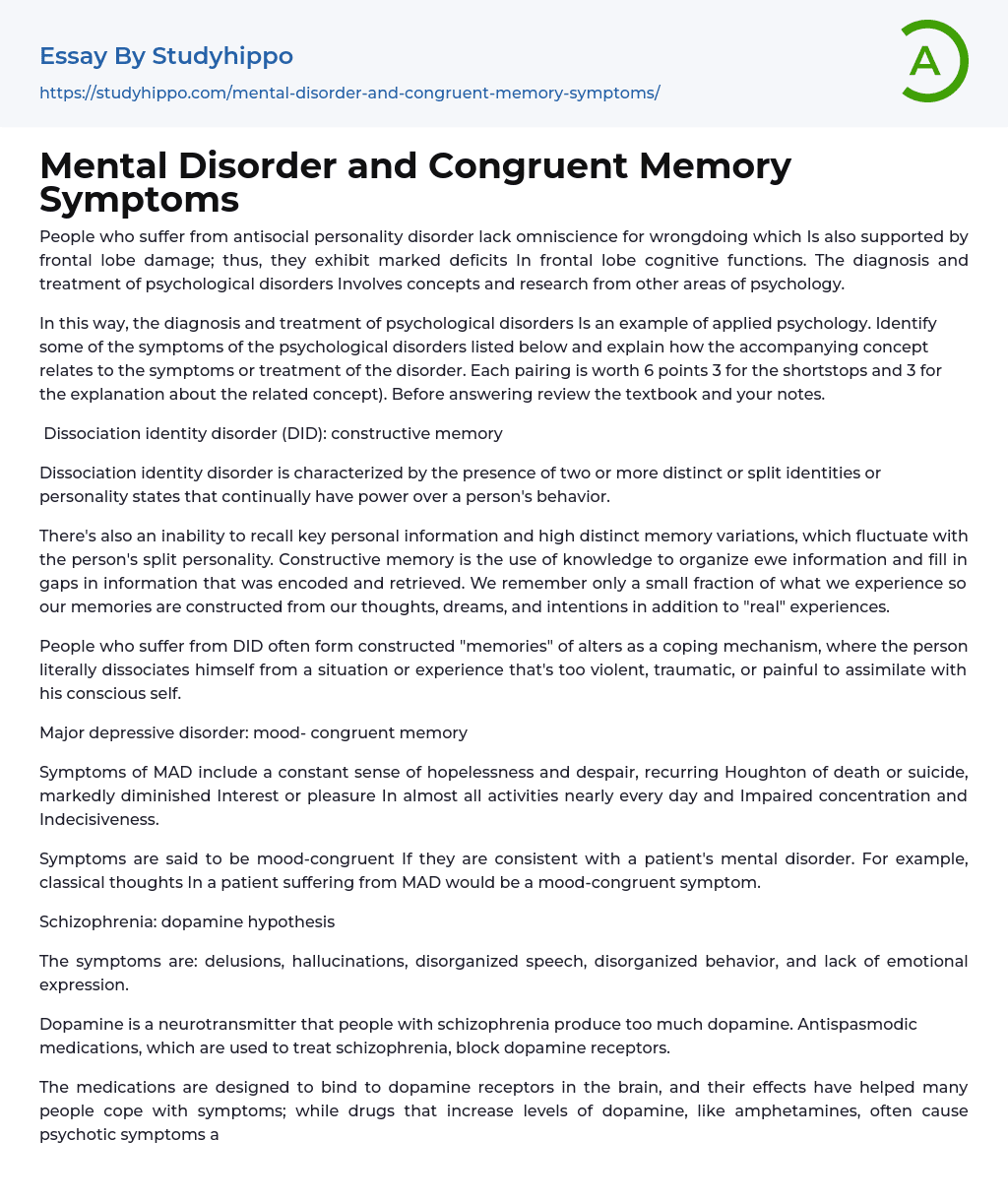

Mental Disorder and Congruent Memory Symptoms Essay Example
People who suffer from antisocial personality disorder lack omniscience for wrongdoing which Is also supported by frontal lobe damage; thus, they exhibit marked deficits In frontal lobe cognitive functions. The diagnosis and treatment of psychological disorders Involves concepts and research from other areas of psychology.
In this way, the diagnosis and treatment of psychological disorders Is an example of applied psychology. Identify some of the symptoms of the psychological disorders listed below and explain how the accompanying concept relates to the symptoms or treatment of the disorder. Each pairing is worth 6 points 3 for the shortstops and 3 for the explanation about the related concept). Before answering review the textbook and your notes.
Dissociation identity disorder (DID): constructive memory
Dissociation identity disorder is characterized by the presence of two or more distinct or split identities or personality states that continuall
...y have power over a person's behavior.
There's also an inability to recall key personal information and high distinct memory variations, which fluctuate with the person's split personality. Constructive memory is the use of knowledge to organize ewe information and fill in gaps in information that was encoded and retrieved. We remember only a small fraction of what we experience so our memories are constructed from our thoughts, dreams, and intentions in addition to "real" experiences.
People who suffer from DID often form constructed "memories" of alters as a coping mechanism, where the person literally dissociates himself from a situation or experience that's too violent, traumatic, or painful to assimilate with his conscious self.
Major depressive disorder: mood- congruent memory
Symptoms of MAD include a constant sense of hopelessness and despair, recurring Houghton of death or suicide
markedly diminished Interest or pleasure In almost all activities nearly every day and Impaired concentration and Indecisiveness.
Symptoms are said to be mood-congruent If they are consistent with a patient's mental disorder. For example, classical thoughts In a patient suffering from MAD would be a mood-congruent symptom.
Schizophrenia: dopamine hypothesis
The symptoms are: delusions, hallucinations, disorganized speech, disorganized behavior, and lack of emotional expression.
Dopamine is a neurotransmitter that people with schizophrenia produce too much dopamine. Antispasmodic medications, which are used to treat schizophrenia, block dopamine receptors.
The medications are designed to bind to dopamine receptors in the brain, and their effects have helped many people cope with symptoms; while drugs that increase levels of dopamine, like amphetamines, often cause psychotic symptoms and a schizophrenic- like paranoid state.
Antisocial personality disorder: autonomic nervous system
Symptoms include superficial charm, shallow emotions and lack of guilt, failure to conform to social norms, impulsively, deceitfulness, failure to learn from experiences, absence of anxiety, and irresponsibility.
Research shows their autonomic nervous system is actually under active at rest.
Because of this low arousal, these individuals are easily bored, have an increased need for excitement and are driven by uncontrollable impulses. The increased need for excitement and poor response to punishment sets the stage for substance abuse and addiction. A study showed that if mothers smoked during pregnancy, their offspring were at risk of developing antisocial behavior. This suggests that smoking brought about lowered oxygen levels with may have resulted in subtle brain injury to the fetus.
- Insanity essays
- Accident essays
- Awareness essays
- Benefits of Volunteering essays
- Challenges essays
- Childhood Memories essays
- Decision essays
- Driving essays
- Event essays
- Excellence essays
- Expectations essays
- Failure essays
- Farewell essays
- Flight essays
- Gift essays
- Growing Up essays
- Ignorance essays
- Improve essays
- Incident essays
- Knowledge essays
- Luck essays
- Memories essays
- Mistake essays
- Obstacles essays
- Overcoming Challenges essays
- Party essays
- Peace Corps essays
- Personal Experience essays
- Problems essays
- Sacrifices essays
- Struggle essays
- Success essays
- Trust essays
- Vacation essays
- Visit essays
- Volunteering essays
- Adhd essays
- Antisocial Personality Disorder essays
- Anxiety essays
- Bipolar Disorder essays
- Depression essays
- Depression And Anxiety essays
- Dyslexia essays
- Learning Disability essays
- Major Depressive Disorder essays
- Mental Disorder essays
- Mental Illness essays
- Psychosis essays
- Schizophrenia essays
- Stress essays



